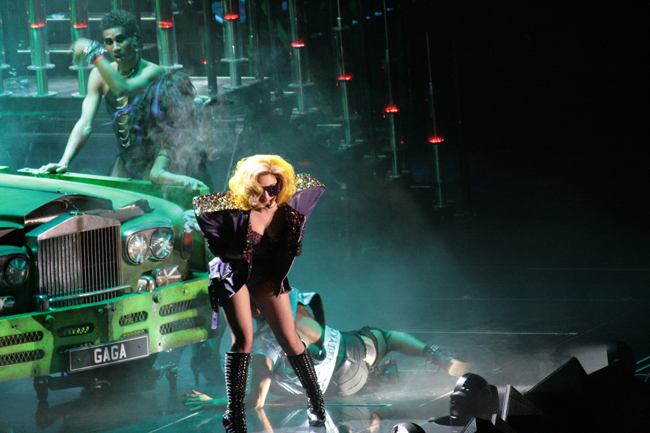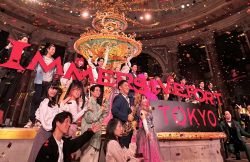
Originally published on metropolis.co.jp on April 2010

Photo by C.B. Liddell
Lady Gaga is having an intimate moment. Perched on a piano stool tinkling the ivories in her underwear, she expresses the depth of her emotions, except that she’s having this tender heart-to-heart with approximately 17,000 people a few yards behind her leather bikini.
“I’m gonna miss you guys when I leave here,” she tells the sold-out crowd at Yokohama Arena, during an extended and embellished version of “Brown Eyes,” a heartfelt piece of piano balladry that counterpoints some of the more Hi-NRG dance numbers on The Fame Monster album. “It’s so amazing here, so beautiful and everyone dresses so well,” she continues, channeling the love.
While the cynical might think buttering up the crowd like this would add a few hundred more album sales to the millions already sold, the great, collective 17,000-headed beast instinctively knows that Gaga is being sincere. High-pitched screams of “Gaga kawaiiiiii!!!” cascade down in appreciation.
We are now halfway through the almost two-hour-long show, which kicked off with the euphoric Europop of “Dance in the Dark,” quickly followed by the synth-hookery of “Just Dance” and “Beautiful Dirty Rich.” This led to the first “talky bit,” where we learned that all this lush, sex-tinged, beat-driven, melody-sugared, visually enhanced entertainment had a message—and a moral one at that.

Photo by C.B. Liddell
“The best part about the ‘Monster Ball’ is that I created it so that my fans will have a place to go,” Gaga explained. “It’s OK, whoever you are or wherever you come from, because tonight and every night after, you can be whoever it is that you wanna be, Tokyo. And to get to the Monster Ball, all you gotta do is follow the glitter way.”
As I’ve already spent a few decades happily being myself, this message of self-definition and inner acceptance has limited appeal for me, but for the large number of teenage girls here tonight—no doubt undergoing issues of identity, such as how much mascara to wear or how much thigh to show—it’s practically the start of a new religion. “Gaga Kawaiiii!!!!” the one immediately behind me screams in frantic adoration.
A rocked-up version of “The Fame” takes us to the first interlude. Cue weird video: Gaga apparently vomiting blue liquid on herself, while the curtain is down. She reappears wearing a pervy plastic dress and takes us through “The Love Game” and the delightful Eurovision tackiness of “Boys Boys Boys.” Having a great, twisted sense of humor and a campy sense of irony enables Gaga to indulge all our guilty pleasures—I almost feel like a 12-year-old boy again, secretly listening to Abba under the bedcovers, hoping that my sneering brothers don’t find out.
Another costume change—black cape and gothic sunglasses—is soon stripped off to reveal the black leather bikini, and Gaga goes into latest hit “Telephone.” Despite the harp notes that introduce it, the song comes over a bit murky, but is enlivened by Gaga’s most rigorous dance performance. This takes us to the piano section, the heart of any Gaga show.
It’s when she sits down at a keyboard that she is most herself, without switching back to being plain old Stefani Germanotta. Here she is at ease and able to open up to her audience, who cherish every moment. After saying how much she’s going to miss everyone, her instincts tell her that things might be getting just a tad too maudlin. She deftly changes gear, mentioning that she received a “book of Japanese cuss words.”
As more high-pitched—and obviously uncomprehending—squeals of “Gaga Kawaiiii!!!” rain down, she asks, “What did you say? Are you cussing at me? Shame on you. I’m just a good girl. I just like bad things.” She then plunges into a strong, resonant version of “Speechless,” similar musical territory to “Brown Eyes,” but given a pumped-up rock ending that leaves Lady G stretched out on her piano stool like a dying swan.

Photo by C.B. Liddell
But a Gaga show is not just about one song followed by another. She has a real grasp of concert dynamics and—despite the language barrier—is clearly reading and responding to the mood of the audience. She also knows that songs are enhanced if they can be slotted into a greater picture, and with the idea of “The Monster Ball” she has given the entire performance an almost coherent narrative, loosely based on “The Wizard of Oz,” with Gaga, of course, in the role of Dorothy. We even get a tornado, as a large part of the arena superstructure is lowered to conceal her for what must be another costume change.
When we see her again, she is resplendent in an absurd fairy-princess dress singing “Eh, Eh (Nothing Else I Can Say),” a song that makes you think of the ebullient optimism of 12-year-old Venezuelan girls. Then, while you’re still taking this in, the ludicrous happens: the part of the stage that Gaga is standing on detaches itself and takes her soaring up into the arena sky, surrounded by clouds of dry ice or steam. Both artistically and—at least in this case—physically (she is perched on very dangerous-looking high heels), Lady Gaga takes risks, and this is another reason she is so adored by her audience. We all love a gambler, especially one who does it solely to entertain us, and the more we love her, the more poignant the sense of danger becomes.
Surviving this ordeal, she reappears quickly in an entirely new costume that beggars belief—something that looks like a giant hairy mushroom. She then strips this off to appear as Lady Godiva—long blonde wig with hair extensions sprouting from the most unusual places, including her groin. This is for “Monster,” a song that obliquely refers to a sense of physical inadequacy that has driven Gaga to become—as far as willpower and a crack team of gay stylists can make her—an iconic femme fatale. As she ends, she asks, “Do you think I’m sexy?” eliciting yet more screams of “Gaga kawaii!!!” supplemented by shrieks of “Gaga daisuki!!!!”

Photo by C.B. Liddell
“Fuck you—I don’t believe you,” she says bluntly, yet somehow still managing to sound endearing.
For the skanky gospel of “Teeth,” she is in a leather basque and torn fishnet stockings with blood (fake or real) smeared on her chest, giving out an aggressive-bitch attitude to go with the sadomasochistic lyrics. This incongruously segues into the cheesy, Eurovision-Song-Contest-pop-saccharine nonsense of “Alejandro.”
A somewhat speeded-up version of “Poker Face,” the song that made her into a household name, leads to the show’s visual highlight, “Paparazzi,” with Lady G in a green “Cubist” dress being attacked by the Fame Monster. This is a giant piece of visually arresting stagecraft, as the massive beast—half-angler fish, half octopus—is finally killed by fire from her breasts. It’s pure entertainment: music, drama, comedy, surrealism, and a heroine we can all root for. A stomping encore performance of “Bad Romance,” an irresistible combination of anthemic hooks and sonic silliness, sends us all home, moved but also amused.
What makes Lady Gaga truly astounding is her complex aesthetic sense. Musically or visually, she knows that beauty and ugliness feed off each other, and that glitter and blood go together as much as sweet melody and dirty rhythms.





